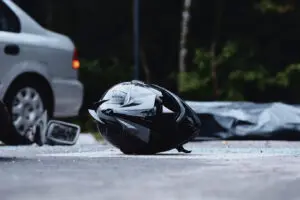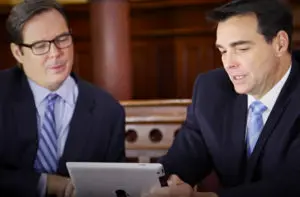Riding in Philadelphia can be especially risky for motorcyclists. The city has notoriously dangerous roads like the Schuylkill Expressway, the Blue Route, Broad Street, and Roosevelt Boulevard. With one of the highest traffic fatality rates for its size, Philadelphia sees a significant number of motorcycle crash fatalities. Philadelphia motorcyclists face greater risks of injury and wrongful death due to congested roads, poor road conditions, aggressive traffic dynamics, and negligent driving.
Our motorcycle accident lawyers at Munley Law Personal Injury Attorneys have over 65 years of experience. We understand Pennsylvania traffic laws and how insurance companies work. Our Philadelphia motorcycle accident attorneys have achieved significant settlements and awards for our clients, earning national recognition. Contact us today for a free consultation, and let us fight for the compensation you deserve.
Pennsylvania Motorcycle Accident Statistics
According to the Pennsylvania Department of Transportation (PennDOT, 2023), Philadelphia is the leading Pennsylvania county for traffic-related accidents.
- Bikers accounted for 3,477 of 179,748 total drivers in crashes; they were the 4th most likely type of vehicle.
- In 2023, Pennsylvania motorcycle fatalities increased by 9.4 percent from 2022 (PennDOT, 2023).
- In 2023, almost 95.8 percent of Pennsylvania’s fatal motorcycle accidents were drivers, whereas 4.2 percent were passengers (PennDOT, 2023).
- There is a 5-year upward trend of motorcycle fatalities in Pennsylvania: In 2019, there were 174; in 2020, there
 were 217; in 2021, there were 226; in 2022, there were 217; and in 2023, there were 238 (PennDOT, 2023).
were 217; in 2021, there were 226; in 2022, there were 217; and in 2023, there were 238 (PennDOT, 2023). - The National Safety Council’s 2021 analysis of the National Highway Traffic Safety Administration (NHTSA) data shows that motorcycle fatalities often occurred under certain conditions: 66 percent occurred on urban roads, 94 percent occurred in good weather, 50 percent occurred during the day, and 55 percent involved crashes with two vehicles.
Motorcycle Helmet Use Statistics
In 2023, PennDOT analyzed Pennsylvania motorcycle accident data, focusing on helmet usage amongst 3,784 motorcyclists:
- 2,129 or 56.3 % of all motorcyclists in the data wore helmets.
- Of the 238 fatalities reported, 133, or 56%, did not wear a helmet.
- 57.9% of the motorcycle riders who wore helmets sustained injuries in 2023.
Pennsylvania has implemented the Motorcycle Vehicle Helmet Law to enforce safety measures for riders.
Who Is Most at Risk for a Motorcycle Accident?
PennDOT’s 2023 vehicle accident data shows that some riders are at higher risk than others based on specific demographics.
- Inexperienced bikers between the ages of 16 and 21.
- Male motorcyclists are involved in more motorcycle accidents than female riders.
- Helmetless motorcyclists are more prone to devastating and fatal injuries.
- Urban motorcyclists must endure traffic congestion, dangerous roads, and others’ driving errors and negligence.
- Motorcyclists driving under the influence were involved in more crashes than a car, truck, or other vehicle drivers.
- Nighttime motorcyclists are more prone to not recognizing other drivers’ negligent behavior, which results in crashes and serious injuries.
Common Causes of Motorcycle Accidents in Philadelphia
 Motorcyclists in Philadelphia face many hazards that can jeopardize their safety. Motorcyclists must be very alert, continuously scanning their surroundings, and adjust their speed. Hidden potholes and debris can lead to sudden slips or severe damage to a bike’s suspension and tires. Natural debris, like gravel, fallen branches, or construction site materials, can shift and move, creating unexpected obstacles that require quick decision-making to avoid.
Motorcyclists in Philadelphia face many hazards that can jeopardize their safety. Motorcyclists must be very alert, continuously scanning their surroundings, and adjust their speed. Hidden potholes and debris can lead to sudden slips or severe damage to a bike’s suspension and tires. Natural debris, like gravel, fallen branches, or construction site materials, can shift and move, creating unexpected obstacles that require quick decision-making to avoid.
Common causes of motorcycle accidents include weather, physical environmental related mishaps, driver negligence, and driving errors:
- Hazardous weather conditions: Fog, freezing rain, snow, sleet, or rain can make roads treacherous and reduce visibility.
- Road hazards: Debris, uncared-for roads, improperly secured construction zones, and other road defects can instigate unforeseen accidents.
- Driver issues: Drowsy, distracted, or impaired driving increases the likelihood of a motorcycle crash.
- Aggressive driving: Negligent behavior such as failing to stop, yielding, tailgating, speeding, and lane splitting can bring on a crash.
- Intersection accidents: Without proper screening, intersections can become quickly dangerous to merge.
- Vehicle defects: Flawed mechanics in motorcycle or passenger vehicles can cause failure and loss of control.
- Sideswipe accidents: When motor vehicle drivers change lanes without checking for blind spots or properly signaling, motorcyclists are usually most vulnerable because of their size and sight lines.
- T-Bone crashes: These types of accidents typically occur when a motor vehicle crashes into the side of a motorcycle after failing to stop or yield.
- Turning accidents: Vehicles turning into an oncoming motorcycle’s path can create a fatal motorcycle crash
High-Risk Areas and Times for Motorcyclists
- Benjamin Franklin Parkway (referred to as “The Parkway” by locals) and Columbus Boulevard connect to expressways and often see heavy congestion and standstill traffic.
- Roosevelt Boulevard has high traffic and involved lane designs, making it dangerous for all drivers. The ongoing congestion makes aggressive driving likely and frequent, with unsignaled lane changes — especially amongst motorcyclists who can be tempted to quickly weave in and out of traffic.
- Major highways such as Interstate 76 (aka “I-76”)and Interstate 95 (aka “I-95”) provide express roads that force motorcyclists to engage in lane-splitting, which involves riding between lanes of stopped traffic. Although lane-splitting helps motorcyclists have an outlet in these scenarios, it is dangerous because of its unexpectedness and the risk of motorcyclists ending up in drivers’ blind spots.
- Center City Philadelphia is known for its dense traffic and constantly crowded intersections in Rittenhouse, City Hall, Society Hill, and Market Street neighborhoods. Motorists need to be mindful of the foot traffic. Rush hour can be challenging, and school and vendor drop-offs add daily congestion.
- South Street has daily from tourists and locals, forcing drivers and riders to navigate through stopped traffic.
- The Vine Street Expressway (by Chinatown) is typically affected by nearby events that usually crowd the Convention Center and Penn’s’ Landing for expos, festivals, and concerts, causing traffic and distractions to drivers.
- Most crashes occur during peak traffic hours, between 3 pm and 5 pm
- Accidents are more frequent on certain holidays due to high traffic volume: Post-New Year and pre-Thanksgiving have been shown to have more crashes; Post-Thanksgiving and Post-Independence Day have been shown to have more fatalities.
What to Do After a Motorcycle Accident
If you or a loved one are in a motorcycle accident, a personal injury lawyer in Philadelphia can provide the legal guidance needed to pursue fair compensation. Motorcycle accidents are usually more catastrophic than car accidents and involve serious physical injury and property damage. Injuries can include broken bones, head injuries, amputations, and can lead to a fatality. Here are the key steps after a motorcycle accident:
- Get medical attention
- Document the accident and collect evidence if you can
- Inform your insurance company
- Contact a reputable motorcycle accident attorney
Insurance companies may offer quick settlements to avoid more expensive claims later, especially in serious cases with high medical costs. A good lawyer can negotiate a fair settlement and take your case to court if needed.
 Choose the Right Law Firm for Your Philadelphia Motorcycle Accident
Choose the Right Law Firm for Your Philadelphia Motorcycle Accident
Choosing the right law firm is a must. At Munley Law, our Philadelphia motorcycle accident lawyers have over six decades of experience assisting injured victims. Our award-winning personal injury attorneys have secured significant settlements for motorcycle accident victims. Recognized as premier personal injury lawyers and certified by the National Board of Trial Advocacy, our lawyer’s results speak for themselves. Contact us today for a free motorcycle case evaluation!

 Choose the Right Law Firm for Your Philadelphia Motorcycle Accident
Choose the Right Law Firm for Your Philadelphia Motorcycle Accident







